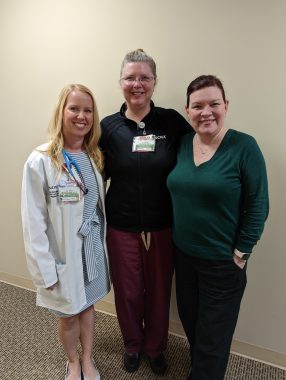Celebrating the Nurse Practitioners on My Post-transplant Care Team
A columnist pays tribute to NPs ahead of National Nurse Practitioner Week
Written by |

Idiopathic pulmonary fibrosis (IPF) patients often require a multidisciplinary team to manage their care. My IPF journey has been shaped by all the medical professionals I’ve encountered along the way.
I was formally diagnosed on Jan. 31, 2017, at the Inova Fairfax Hospital’s Advanced Lung Disease and Transplant Center in Falls Church, Virginia. After some initial intake visits, I was moved to the pre-transplant phase of their program.
During this phase, I underwent all the testing required for a transplant committee to reach a decision. Once the committee recommended that I proceed with a transplant, I had to wait. I was listed on March 19, 2021 and received the call a few months later, on July 9.
Transitioning to post-transplant care
I was first introduced to the role of post-transplant nurse practitioners (NPs) shortly after my diagnosis during an Inova patient education session. Immediately after my bilateral lung transplant on July 10, 2021, my care team increased by three, with the addition of my post-transplant NPs. The first one I met was Lauren Marinak, when I was an inpatient in the days immediately following my transplant.
When I was discharged on July 20 of that year, my calendar was full of clinic appointments and pulmonary rehabilitation sessions. At the appointments, I met Jessica Chun and Margaret Fregoso, who work as a team to coordinate care for post-transplant patients.

From left: Lauren Marinak, NP, Jessica Chun, DNP, NP, and Margaret Fregoso, NP. These nurses are key to my post-transplant care. (Courtesy of Jessica Chun)
Why an NP?
According to the American Association of Nurse Practitioners (AANP), there are more than 355,000 NPs licensed to practice in the U.S. NPs have the same foundation as registered nurses, but are additionally required to have either a master’s or doctoral degree in nursing.
In the years since my diagnosis, NPs have cared for me after a number of procedures. An NP conducted the follow-up assessment after my first heart catheterization. The same is true with my post-transplant NPs. They have conducted the majority of my clinic visits over the past 15 months.
When necessary, an NP can bring any issues to a doctor at the clinic. But in most cases, my NPs focus on monitoring and maintaining my health during my transplant recovery.
The NP cadre can write prescriptions, including for narcotics, in all 50 states and the District of Columbia. AANP notes that many have admitting privileges at hospitals. Their experience as an NP, coupled with their tenure in a special practice area, make them an invaluable part of a care team.
Celebrating our NPs
All three of my post-transplant NPs provide me with the best care. I’ve never hesitated to see one of them instead of a doctor, as it never compromises the quality of my care. These nurses are one of the many resources available at my care center.
In honor of National Nurse Practitioner Week Nov. 13-19, I need to thank these three NPs. Yet saying “thank you” doesn’t seem sufficient when they have been vital in helping me make every breath count.
Join me in recognizing these amazing professionals by telling me about an NP on your care team in the comments below. How have they made a difference in your life?
Note: Pulmonary Fibrosis News is strictly a news and information website about the disease. It does not provide medical advice, diagnosis, or treatment. This content is not intended to be a substitute for professional medical advice, diagnosis, or treatment. Always seek the advice of your physician or other qualified health provider with any questions you may have regarding a medical condition. Never disregard professional medical advice or delay in seeking it because of something you have read on this website. The opinions expressed in this column are not those of Pulmonary Fibrosis News or its parent company, Bionews, and are intended to spark discussion about issues pertaining to pulmonary fibrosis.








Leave a comment
Fill in the required fields to post. Your email address will not be published.